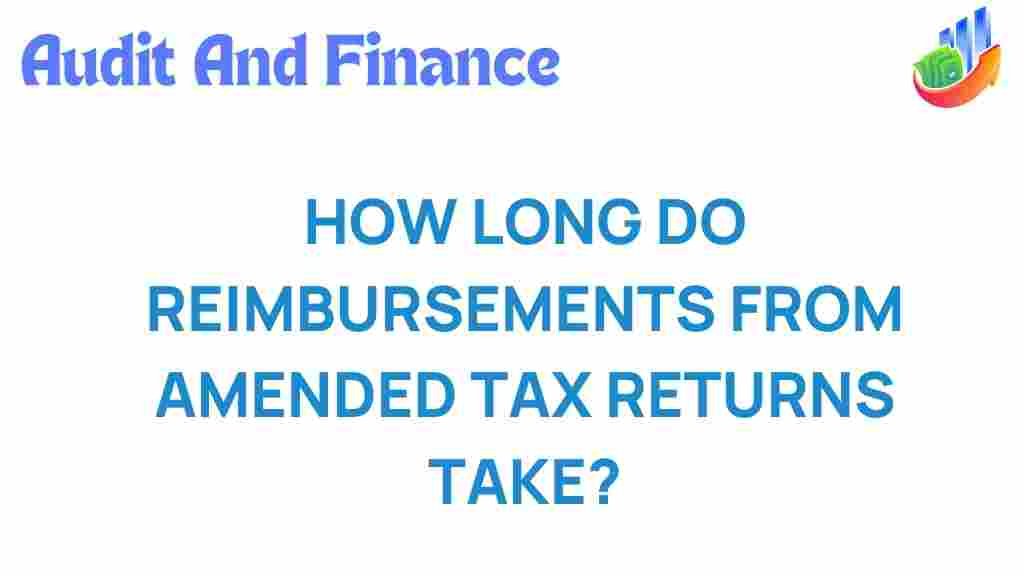The Intriguing Timeline: How Long Do Reimbursements from Amended Tax Returns Take?
When it comes to managing your finances, understanding the reimbursement process for amended tax returns is crucial. Taxpayers often find themselves needing to amend their returns due to errors or changes in their financial situations. This can lead to questions about timelines and how long it takes for the IRS to process these changes and issue refunds. In this article, we will explore the intricacies of the reimbursement timeline for amended tax returns, the filing process, and essential tips for effective financial planning.
Understanding Amended Tax Returns
An amended tax return is a form submitted to the IRS to correct or change an already filed original tax return. The most common form used for this purpose is Form 1040-X. Taxpayers might need to file an amended return for various reasons, including:
- Incorrect filing status
- Errors in income reporting
- Omissions of credits or deductions
- Changes in tax laws affecting your return
Filing an amended return can be a straightforward process, but it does require careful attention to detail to ensure that all changes are accurately reported.
The Filing Process for Amended Tax Returns
To file an amended tax return, follow these steps:
- Identify the Need for Amendment: Review your original tax return and determine what errors need correction.
- Obtain Form 1040-X: You can download this form from the IRS website.
- Complete the Form: Provide information from your original return, explain the changes, and indicate the correct amounts.
- Attach Supporting Documentation: Include any necessary documents that support your amendments, such as W-2s or 1099s.
- Mail the Amended Return: Unlike regular tax returns that can be filed electronically, amended returns must be mailed to the appropriate IRS address.
After submitting your amended return, you may wonder how long it will take for the IRS to process it and issue any reimbursements or refunds due to you.
The Timeline for Reimbursements from Amended Tax Returns
The timeline for receiving reimbursements from amended tax returns can vary based on several factors. Generally, the IRS states that it can take up to 16 weeks for them to process amended tax returns. Here’s a breakdown of what you can expect during this timeline:
- Initial Processing: Once the IRS receives your amended return, they will begin processing it. This can take 8 to 12 weeks.
- Review Period: The IRS may need additional time to review your amendments if they require more information. This could extend the timeline by several weeks.
- Refund Issuance: If your amended return results in a refund, it will be issued after processing is complete. Refunds can take an additional 2 to 4 weeks to reach you.
Factors Affecting the Timeline
Several factors can influence how long it takes to receive reimbursements from amended tax returns:
- Volume of Claims: During peak tax season, the IRS processes a higher volume of returns, which can slow down the processing time.
- Complexity of Amendments: More complex amendments may require additional reviews and can take longer to process.
- Accuracy of Information: If your amended return contains errors or is incomplete, it may lead to delays in processing.
- IRS Operations: Changes in IRS operations, such as staffing or technology issues, can impact processing times.
Tracking the Progress of Your Amended Return
As a taxpayer, you can track the status of your amended return using the IRS’s online tool called “Where’s My Amended Return?” This tool allows you to check the status of your amended return and find out where it is in the processing timeline.
Troubleshooting Tips for Delays
If you find that your amended tax return is taking longer than expected, consider these troubleshooting tips:
- Check for Errors: Review your amended return to ensure all information is accurate and complete.
- Contact the IRS: If it has been more than 16 weeks, you can contact the IRS directly for an update on your return’s status.
- Be Patient: Remember that processing times can vary, and patience is key when waiting for refunds.
Financial Planning Considerations
Understanding the timeline for reimbursements from amended tax returns is essential for effective financial planning. Here are some tips to keep in mind:
- Budgeting for Delays: If you expect a refund, plan your budget around the possibility of delays in receiving it.
- Emergency Fund: Maintain an emergency fund to cover expenses while waiting for reimbursements.
- Stay Informed: Keep yourself updated on any changes in tax laws that may affect your future tax filings and potential reimbursements.
Conclusion
In summary, the timeline for receiving reimbursements from amended tax returns can be a lengthy process, often taking up to 16 weeks or more. Understanding the filing process, monitoring the status of your return, and planning your finances accordingly are critical steps in navigating this journey. By staying informed about tax laws and being proactive in your financial planning, you can alleviate some of the stress associated with waiting for tax refunds. For more information on tax-related topics, consider visiting the IRS website or consulting a tax professional.
This article is in the category Taxation and created by AuditAndFinance Team
